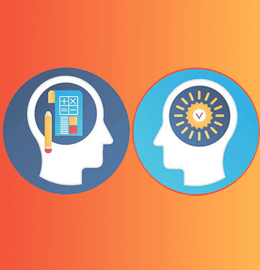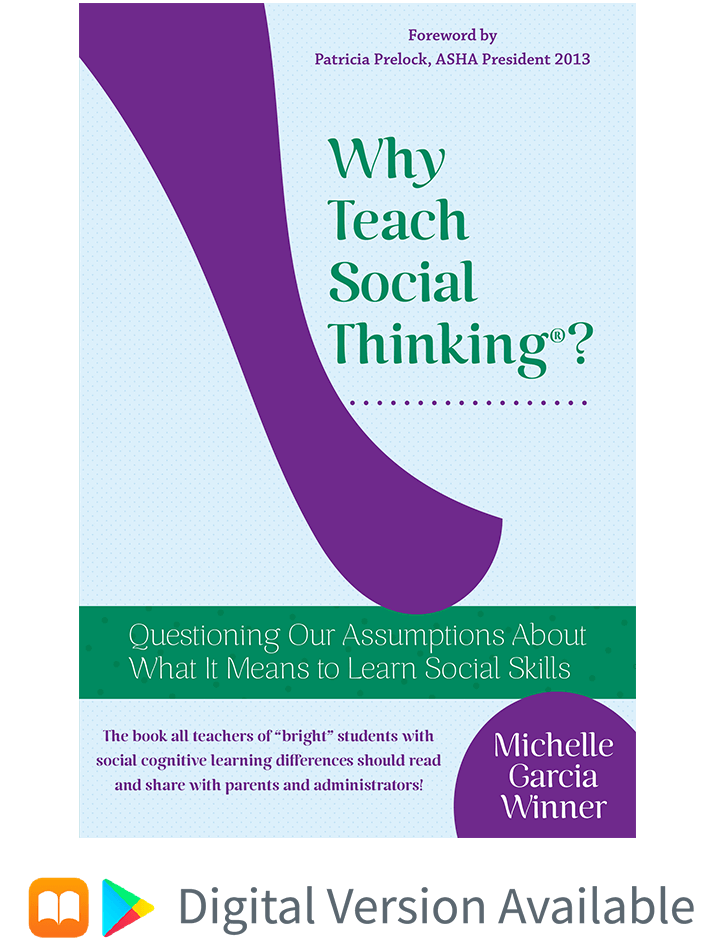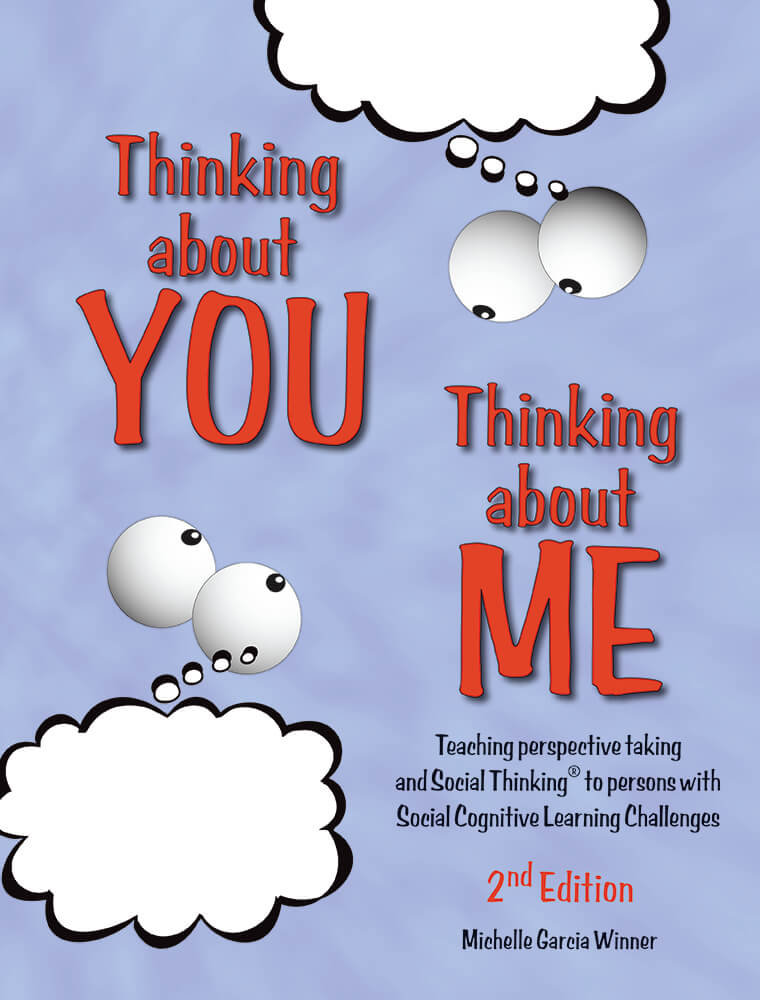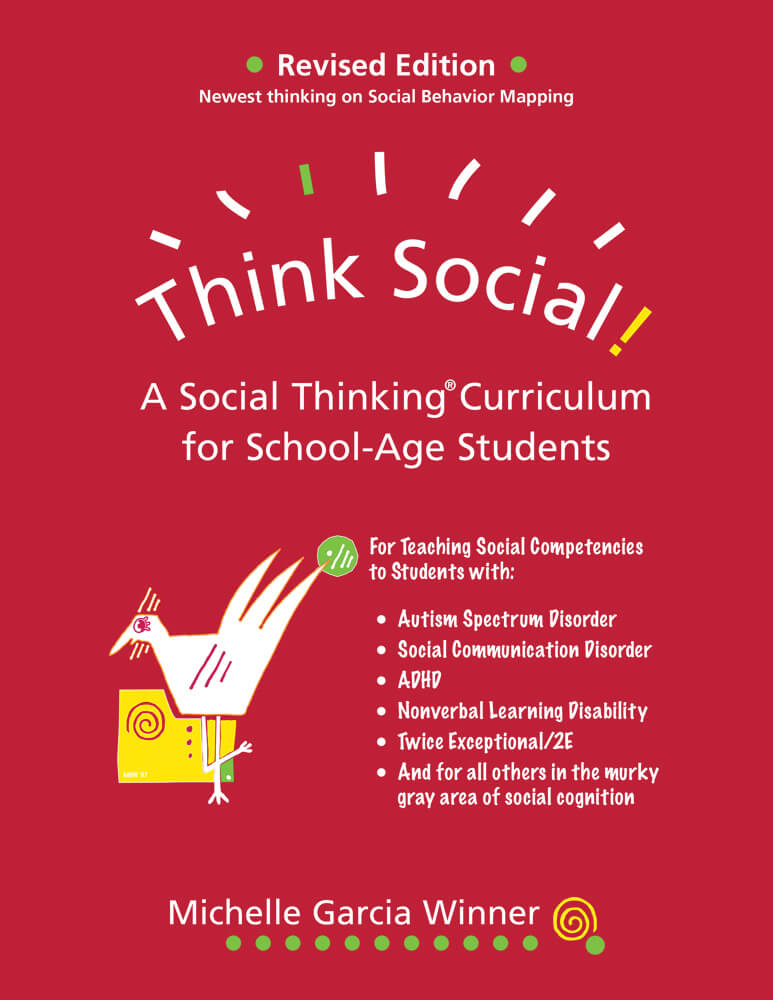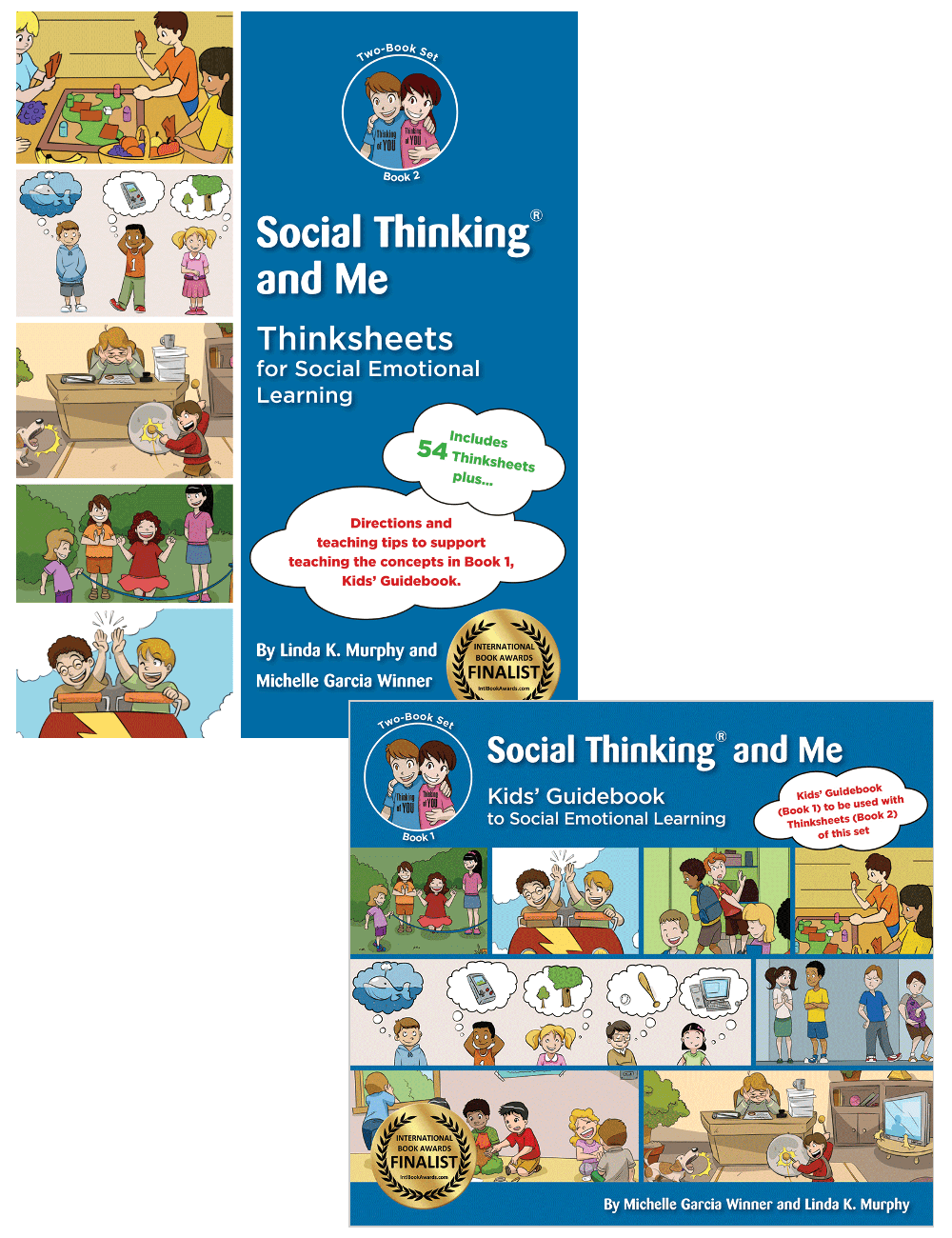© 2021 Think Social Publishing, Inc.
People around the world are using the Social Thinking Methodology and its practical concepts and strategies to help all students (not just those with social challenges,) improve their social competencies. Family members and professionals of all kids, including speech-language pathologists, general education teachers, special educational teachers, counselors, social workers, therapists, school administrators, etc. use our curriculum and intervention materials to teach self-awareness, self-regulation, executive functioning, perspective taking, and social-emotional learning. Many in schools also use the Social Thinking Methodology to support IEP (Individualized Education Program) development, PBIS (Positive Behavioral Interventions and Supports), SEL (social-emotional learning), and RTI (Response to Intervention) initiatives.
Our core teaching frameworks, concepts, and strategies are adaptable to individuals across the lifespan starting at age 4. We start by teaching self-awareness. As students become increasingly mindful of how they are impacting others around them, this awareness fosters improved self-regulation. One of the fundamental tenets that runs through all our teachings and that we repeat again and again is this: what you do affects how others think and feel, and that impacts how they respond to you.
Social Competencies and The Social–Academic Connection
Social competencies not only enable us to maintain relationships, they are essential for success in academic lessons that require us to consider others’ thoughts, feelings, intentions, beliefs, motives, plans, etc.
Social competencies are required to work effectively as part of a group, stay on task, figure out the expected times to talk in class, and share space well with others in the classroom, cafeteria, and on the playground. We also rely on our social competencies when reading stories to understand character relationships and the deeper meaning behind the actions of characters in context. If a student has poor social abilities, he or she will struggle to take the perspective of characters, figure out how they are affected by others, and understand why characters act and feel as they do. These students tend to be “more literal” in how they interpret social cues and can have very strong factual learning. They tend to do better with informational text but are weak in comprehending social literature.
Social competencies are also required to write an effective essay. We must take the perspective of the reader and consider what they may already know or not know about the topic we’re writing about. We must consider how to organize the information so it will be logical for the reader to follow. If a student has social learning challenges, he or she will have difficulty understanding the perspective of the reader and will therefore have trouble writing a persuasive essay that is well organized and easily understood by others.
Academic standards require students to demonstrate point of view and describe, compare, or contrast information about how characters are thinking and feeling while using context-sensitive vocabulary. This all heavily relies on one’s ability to understand the social world.
Mainstream teachers typically expect students to come into the classroom with a solidly functioning social mind that they can apply in working through curriculum lessons across a wide range of subjects. Teachers are not well-equipped to teach students who come to school with limited perspective-taking skills how to figure out the social thoughts, feelings, and intentions of the characters or subjects they are reading about. The expectation is that students already have the ability to do this on their own.
Considering the social mind and its vital importance in achieving success in academics may seem new to some readers. That’s because historically we have taken social cognition for granted. Everyone started out with the same set of thinking tools, right? Success is just a matter of applying oneself. We now know that’s simply not true. Some students are born to brains that struggle to figure out the social world. Our expectations need to change accordingly.
Using Social Thinking Methodology materials, students work to build social competencies (self-regulation, executive functioning, etc.). These skills help students understand themselves and others to better navigate the social world and foster relationships, while also honing their ability to manage themselves in a classroom, understand the material at a deeper level, and meet the academic standards. The Social Thinking Methodology helps foster both social and academic performance; the two are inextricably intertwined.
Social Thinking Products to Use with Students
Our tools offer a scope and sequence for teaching social concepts in a way that makes the implicit explicit. At the heart of our methodology is helping individuals understand how they think and feel, and consider the thoughts and feelings of those around them. Many of our materials are used in inclusion-based classrooms, and some are being adopted district-wide with all classes and all grades. Here are some of our most popular products used by educators, clinicians, and families around the world. New to Social Thinking? Check out our most up-to-date recommendations for getting started with the Social Thinking Methodology.
Preschool to Primary:
- We Thinkers! Volume 1 Social Explorers (ages 4-7)
- I Get It! Building Social Thinking and Reading Comprehension Through Book Chats (ages 4-9)
- Movie Time Social Learning (ages 4-18)
- You Are a Social Detective! (ages 5-10+)
- The Power of Thought on Feelings (ages 7-10)
- Superflex®… A Superhero Social Thinking Curriculum (ages 7-10+)
- Should I? or Shouldn't I? Revised Elementary Edition (ages 8-11)
- Social Thinking and Me (ages 9-12)
- Social Fortune or Social Fate (ages 10+)
Secondary to Adulthood:
- Social Thinking Thinksheets for Tweens and Teens, Revised Editions (ages 11-18)
- Should I? or Shouldn’t I? What Would Others Think? Revised Edition for Teens (ages 12-18)
- Socially Curious and Curiously Social (ages 14-22)
- Social Thinking at Work: Strategies for Understanding and Navigating the Workplace (ages 18+)
Almost All Ages:
- The Zones of Regulation® (ages 4+)
- Social Situation Mapping (ages 8+)
Social Thinking Products for Professionals and Family Members
Our core products are intended to help the interventionist (professional, parent, caretaker) learn important social concepts and tools to teach social competencies to ages 4 and up. Unlike our other materials that are designed to be used with specific age groups, these products teach concepts so foundational that they apply across ages. Check out our core products.
We also share our newest thinking and strategies through our free webinars, free articles, and On Demand courses. Check out our free 10 Core Concepts webinar series to learn our foundational information through engaging videos with founder Michelle Garcia Winner.









